August 14, 2023
Queen Charlotte: A Bridgerton Story is a brilliant example of 21st-century storytelling. Part of its cleverness has to do with how it plays with facts. Even though Queen Charlotte: A Bridgerton Story is a Regency-era historical romance, it departs from the historical record in ways that are rewarding for a contemporary audience and therefore reveals something about the connection between creativity and meaning-making in the 21st century.
Both the official website of the British Royal Family and the Smithsonian Magazine offer the historically accepted versions of Queen Charlotte (19 May 1744 – 17 November 1818). However, since Netflix’s Queen Charlotte: A Bridgerton Story isn’t interested in facts, where do its sympathies lie?
One of the criticisms of Netflix’s version of Queen Charlotte is that she wasn’t black and racial-economic slavery made the wealth of the Regency period possible. This focus on the historical inaccuracies and slights of hand of the limited series is like being angry that your math teacher can’t teach you to write an English essay. It’s asking the wrong question and therefore missing what’s truly insightful about this series. Queen Charlotte: A Bridgerton Story is fantasy. It takes a real historical…



